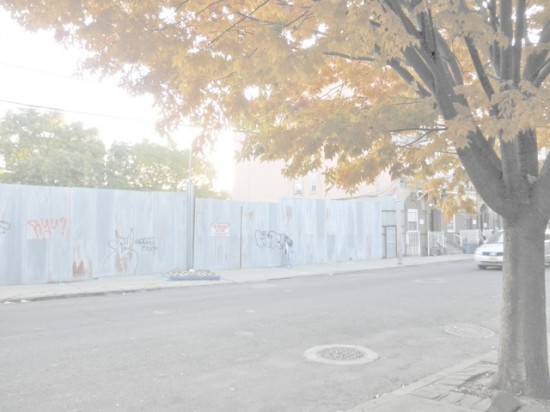
A group of Mott Haven residents has organized to protest a proposed housing development for the mentally ill, saying the neighborhood already has far more than its fair share of social service agencies.
The group, called Voices of the People, is frustrated with the influx of social service programs, and adds they were given no advance notice that plans for still another were underway.
“We have so many shelters and programs and they are all crowded. We are hyper-saturated,”said resident Marcelino Sanchez. “I think it is a crime.”
The publicly funded 60-unit doorman facility on E. 144th Street between Brook and Willis Ave. will include 18 units dedicated to general low-income housing. Another 42 will be for adults and young adults with mental illness. The low-income housing will include studios and one- and two-bedrooms for tenants and will have a minimum income requirement. For those living with mental illness, there will be on-site support including case management and mental-health counselors.
At a community board meeting in October, residents expressed concern that the development would bring back problems their community faced in previous decades.
Dr. Marian Rivas, whose family has owned a home on 144th St. since 1949, recalled neighborhood safety problems of the 1960s and ’70s. Since then she has seen the area steadily improve, until several years ago when she started to notice increased drug use and loitering, some of which she and other frustrated residents say stems from unsupervised clients from the area’s many social service facilities.
“It looked like Berlin after the war,” Rivas recalled. “We are survivors through the worst. Why should we have to go through it again?”
According to Carlos Garcia, director of residential programs for The Association for Rehabilitative Case Management and Housing, the non-profit that plans to open the site, this isn’t the first time his organization has received resistance from a community based on concerns about the impact.
He said applicants are screened thoroughly for histories of violence and sex offenses and that only graduates of ACMH programs will be housed.
“Typically we are faced with the ‘not-in-my-backyard’ kind of thing,” Garcia said.
He said that stories of people defecating in the streets and exposing themselves were not based in reality. “It’s just like in any neighborhood,” Garcia said. “If you see that kind of stuff, you call the police.”
But homeowners argue that rather than provide housing for deserving low-income residents from the neighborhood, the developments draw people from elsewhere looking for better access to services. Some residents expressed concerns about the safety of their children, fearing the development will draw a dangerous clientele to a neighborhood filled with schools. Others were concerned about decreasing property values.
“Much of their wealth is tied up in their homes,” Rivas said of her neighbors, adding they will urge elected officials to help stymy the project by cutting off the developers’ funding.
State Senator Jose M. Serrano attended the meeting to discuss other matters, but soon found himself fending off criticism from the group directed towards him and other elected officials for not defending residents’ rights.
“When you have an over-concentration of social services in one community, you have to ask why,” Serrano responded, admitting he knew nothing of the project before hearing the group complain at the October meeting.
“So why don’t we have these facilities on 72nd and Park Avenue?” he said, adding, “these services can be spread out.”
Community Board 1 district manager Cedric Loftin said the number of units for low-income residents is too small to offset changes he believes will occur in the neighborhood such as an increased police presence and an increased feeling of insecurity. He said the community board will work with the governor’s office and other elected officials to try to get funding reallocated to a project elsewhere.
“The location is bad and it needs to be looked at from the perspective of the community that’s going to be impacted,” said Loftin.
The citizens group has met with elected officials who have vowed to help them fight the project, including Assemblywoman Carmen E. Arroyo.
Daniel Johansson, CEO of the site developer, cited a study done by the Furman Center at NYU in 2008, which found that property values actually increased when supportive housing was developed in the area. He said the area was chosen because of a partnership with Lincoln Hospital and a need for supportive and low-income housing in the area.
“There are so many folks that end up being re-hospitalized in the Bronx who have a mental health issue,” he said. “Once you have a roof over your head it’s so much easier to get your life together.”

it seems like every time mott haven takes a step forward , someone dumps another facility that takes us two steps back. If the south Bronx is ever gong to prosper , the dumping of unwanted facilities must stop. the politicians and community boards must stopthese practices and put the people, and our community first.
that is so true Ms Rodriguez, our neighborhood is a dumping ground for shelters, drug programs and halfway houses.
its a shame that any progress is met with more undesirables from other parts of the city, let us deal with the knuckleheads in our community first before you come and dump another 100 or so like the city just did at 142st and third avenue and 141st and Alexander ave
[…] Mallén’s feature on a pair of video stores that stock Nigerian films. Gwen McClure reported on opposition to a proposed housing development for the mentally ill. Melissa Noel profiled a multi-faceted […]
[…] Homeowners fight proposed housing facilities […]